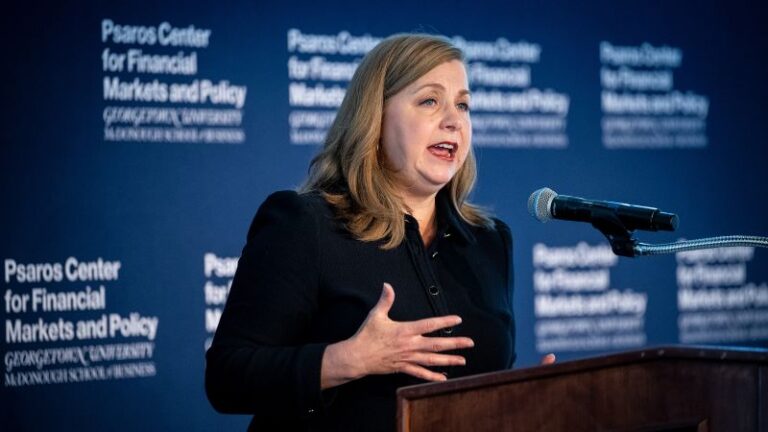Washington
CNN
—
Some Federal Reserve officials are joining President Donald Trump in calling for lower interest rates as soon as July.
Fed Vice Chair for Supervision Michelle Bowman on Monday downplayed the potential impacts of Trump’s tariffs on prices and said the US central bank should swiftly lower rates to preserve the labor market’s health.
“It is time to consider adjusting the policy rate,” Bowman said. “Should inflation pressures remain contained, I would support lowering the policy rate as soon as our next meeting in order to bring it closer to its neutral setting and to sustain a healthy labor market.”
Bowman is the second Fed official to join Trump in calling for lower borrowing costs. On Friday, Fed Governor Christopher Waller said tariffs will likely only result in a “one-off” increase in inflation. Both Bowman and Waller are Trump appointees.
For months, Fed officials have said they prefer to wait to see how Trump’s major policy shifts affect the US economy first before considering further rate cuts. At its policy meeting earlier this month, the Fed kept its benchmark lending rate unchanged for the fourth consecutive time.
But that strategy hasn’t sat well with Trump, who has relentlessly lashed out at the central bank and its leader, Fed Chair Jerome Powell, for not lowering rates. Trump has hurled various insults at Powell, describing him as a “fool” and a “numbskull.”
Now, the Fed’s wait-and-see posture is slowly crumbling, even as tensions in the Middle East heat up, which raises the risk of higher global energy prices. And the jury is still out on the ultimate impact of Trump’s tariffs.
Bowman doesn’t seem concerned over tariffs and the Middle East conflict
Bowman said it’s possible the Israel-Iran conflict — which escalated over the weekend with the US striking at three Iranian nuclear sites — results in higher commodity prices. And there’s still the lingering possibility of Trump’s trade war also pushing up prices, she said.
Still, that may not even result in higher consumer prices because businesses don’t have much leverage to hike prices this time around, Bowman said.
“I am certainly attentive to these inflation risks, but I am not yet seeing a major concern, as some retailers seem unwilling to raise prices for essentials due to high price sensitivity among low-income consumers and as supply chains appear to be largely unaffected so far,” Bowman said.
Bowman isn’t the only Fed official seemingly not worried about the potential economic impact of the Israel-Iran conflict. Powell has said higher energy prices spurred by the conflict will likely be short lived.
“When there’s turmoil in the Middle East, you may see a spike in energy prices, but it tends to come down. Those things don’t generally tend to have lasting effects on inflation, although of course in the 1970s, they famously did,” Powell said in a news conference following the Fed’s June 17-18 policy meeting.
“But, we haven’t seen anything like that now. The U.S. economy is far less dependent on foreign oil than it was back in the 1970s,” he added.
Economists have said the economic impact of the current conflict largely depends on how out of hand it gets. A forecast from analysts at EY-Parthenon shows that the US economy could contract by a massive 1.9% annualized rate if the Middle East plunges into an all-out regional war. But in a “contained” scenario, the US economy could contract only slightly.


